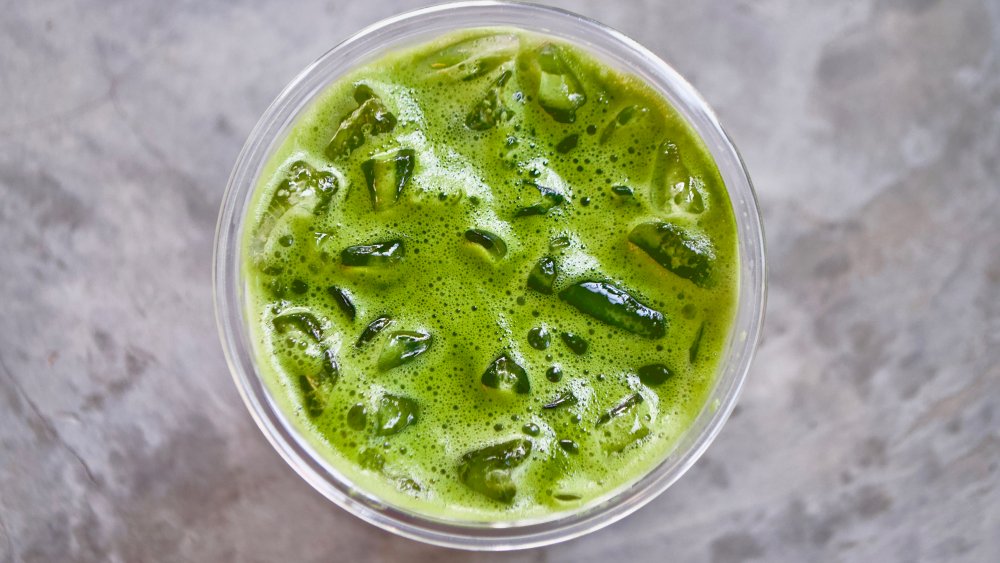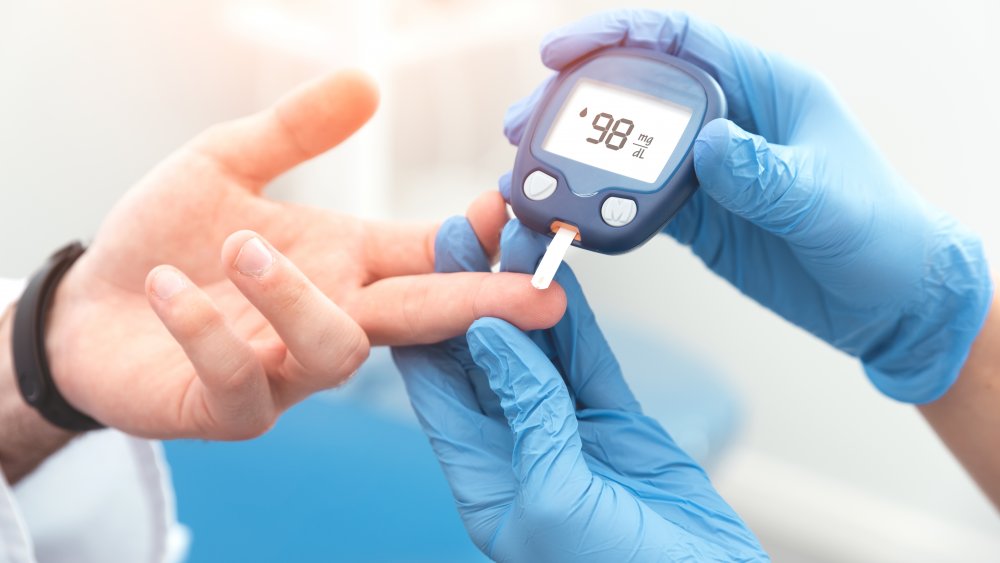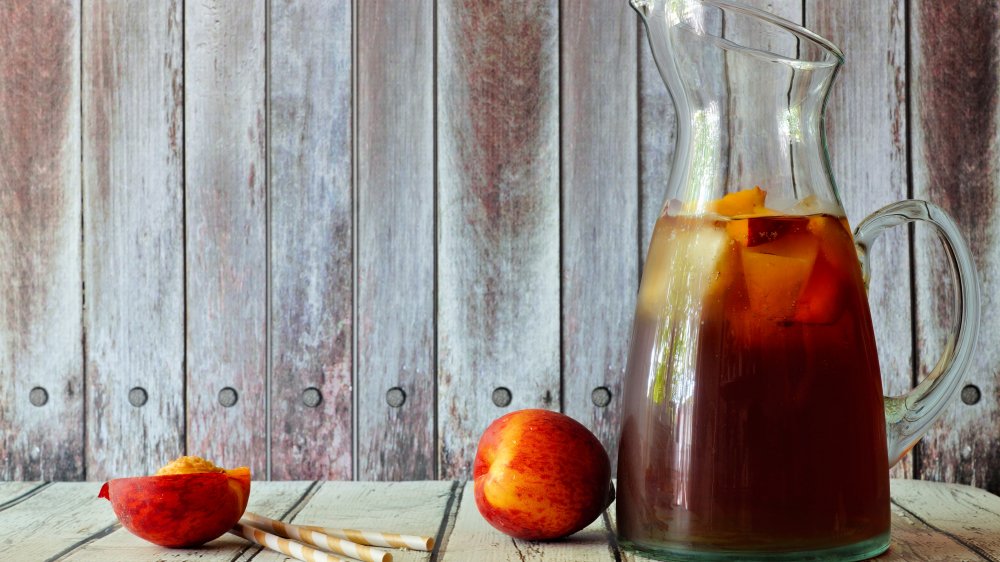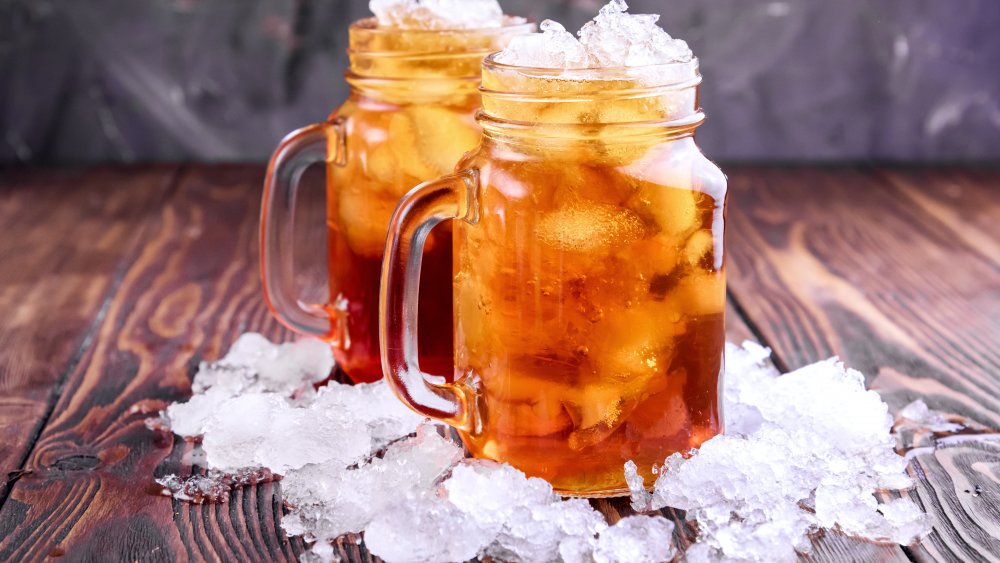When You Drink Iced Tea Every Day, This Is What Happens To Your Body
Iced tea is the perfect summertime drink — it's cold and refreshing, and it plays well with added fruits and other flavorings. But if you drink iced tea every day, is it good for you?
Iced tea is usually made from black tea, but you can use any type of tea you like, including green, white, and herbal teas like hibiscus or peppermint. In fact, the health benefits may differ based on which type of tea you use. How you brew iced tea may also have an impact on its healthiness. Dr. Chris Norris at Sleep Standards points out that iced and hot teas are nearly identical in terms of health properties, especially since iced tea is usually brewed hot and then simply allowed to cool. But he told The List, "Some research shows cold brewing for a longer duration may have more health benefits than steeping your leaves in hot water. Cold-water steeping is reported to maximize tea health benefits, including higher antioxidant activity."
So, just what might happen to your body if you drink iced tea every day?
If you drink iced tea every day, it can help you stay hydrated
Getting enough water does more than simply quench your thirst. Staying properly hydrated helps deliver nutrients to cells, maintain body temperature, fight infection, lubricate joints, and boost your mood, among other things. That's not surprising, considering about 60 percent of the human body is actually water.
The Mayo Clinic recommends adult women get about 11.5 cups (2.7 liters) of water a day, while adult men should aim for 15.5 cups (3.7 liters). Luckily, this doesn't all have to come from plain water.
According to Dr. Chris Norris at Sleep Standards, iced tea is a great option. He told The List. "It doesn't matter whether it's herbal, black, green or chamomile; hot or cold — tea is just about as hydrating as water." A 2011 study published in the British Journal of Nutrition came to the same conclusion. The researchers noted that, although the caffeine in black tea has often been considered dehydrating, their findings indicated that tea and plain water were almost identical in their ability to provide hydration. So, if you want to hydrate, you can drink iced tea every day, though water is presumably the better option.
If you want to lower your caffeine intake but still need a little bit, drink iced tea every day
If you're trying to kick your coffee or energy drink habit but either can't or don't want to give up caffeine entirely, you may be able to wean yourself down to a more reasonable amount by switching to iced tea. Registered dietitian Trista Best shared, "[Iced tea] is a great drink for anyone who needs assistance getting a little extra concentration or energy to focus. Many excessive caffeine drinkers have chosen to detox to a lower amount by transitioning to iced tea over coffee or other high-caffeine beverages."
As shared by The Washington Post, research suggests that the average American adult consumes between 122 mg and 225 mg of caffeine a day. Side effects of consuming too much caffeine, according to Healthline, can include anxiety, sleep problems, increased heart rate and blood pressure, and, ironically, fatigue. So how much caffeine is in your iced tea? The University of Utah's mathematics department shared that while a 2-ounce espresso has 100 mg, an 8-ounce glass of iced tea has only about 47 mg. And if you're drinking a green tea, you'll get even less — only about 15 mg of caffeine.
Caffeine can do a lot of crazy things to your body, so you may want to lower the amount you consume. But heads up: There's a lot that can happen to your body when you give up caffeine.
If you drink iced tea every day, it may upset your stomach
Although some herbal teas, such as peppermint, ginger, and fennel, can help soothe a troubled tummy, iced tea made from black tea may have the opposite effect.
The culprit? Tannins — bitter and astringent substances found in a variety of plants, as noted by Wine Enthusiast. While the tannins in wine tend to get the most attention, black tea is high in tannins, according to Healthline. However, the exact amount will vary significantly based on quality of the leaves, preparation, and steeping time). While tannins may have numerous health benefits, they can also cause nausea on an empty stomach. According to health educator Shana Robinson, "The tannins in tea are responsible for the bitter taste, which along with the icy temperature, irritates and inflames the digestive tract and can cause nausea."
If you feel nauseous when you drink iced tea every day, you don't have to abandon it. Robinson suggests adding a splash of dairy or non-dairy milk to create a more soothing effect because proteins and carbohydrates bind to tannins and help reduce their effects.
If you drink instant iced tea every day, you may not actually be getting the antioxidants you think
Powdered instant iced tea mixes are convenient, but they aren't anywhere near as healthy as iced tea made from regular tea bags.
Instant iced tea is highly processed. These mixes are created using spent tea leaves, tea wastes, or fermented leaves. The liquid is concentrated under low pressure and then dried into a powder by freeze-drying or spray-drying. All that processing means that instant iced tea loses more than 90 percent of its original antioxidants, and some contain none at all.
Bottled and canned green iced teas also pale in comparison to their freshly brewed counterparts. According to a 2001 study published in the Journal of Agricultural and Food Chemistry, these commercially produced beverages contained few of the catechins found in green tea. As explained by WebMD, catechins are flavonoids — substances found in plants with strong antioxidant and disease-fighting properties.
It's cheap and easy to make iced tea at home, so brew your own if you want to reap all the health benefits when you drink iced tea every day.
When you drink iced tea every day, you could lose weight
When it comes to the health benefits of iced tea, researchers usually focus on black tea. But one type of herbal tea may actually be more helpful when it comes to losing weight.
A 2018 study published in the journal Frontiers in Physiology found that drinking herbal tea made from yerba mate, a plant native to South America (via Healthline), encouraged fat oxidation. Kathryn Schwab, a health and wellness researcher at Tons of Goodness, explained, "[Fat cells] are in a constant state of turnover, meaning that fat is continuously entering or exiting the cell ... Fatty acids released into the bloodstream can then be burned (oxidized) for energy. When fat is oxidized, this results in weight loss." Interestingly, the 2018 study found that iced yerba mate was more effective at fat oxidation than hot yerba mate.
If you're one of the 56.4 percent of American women trying to lose weight, you may want to swap out your regular iced black tea for an iced yerba mate.
You may stay looking young if you drink iced tea every day
If you're worried about aging, you're not alone. A 2017 survey found that 28 percent of women under 25, 42 percent of women aged 25 to 34, and 54 percent of women between the ages of 35 and 44 worried "regularly" about how they're aging, as reported by the New York Post. Fortunately, believe it or not, the fountain of youth might actually be a pitcher of iced tea! Yes, if you drink iced tea every day, you may be doing your skin a favor.
When it comes to the physical signs of aging, collagen plays an important role. That's because collagen, a protein found throughout the body, provides structure to our skin (in addition to performing many other important functions), as explained by Healthline. As we age, our body's ability to create new collagen decreases, leading to saggy, wrinkled skin (via HuffPost). But, as nutritionist Lisa Richards told The List, "It's been shown that dietary polyphenols, like those found in iced tea, can stimulate the production of collagen in the body." These polyphenols, she explained, can also prevent damage to collagen from free radicals.
If you're stressed, you might want to drink iced tea every day
According to a 2017 Gallup poll, 44 percent of Americans feel stressed in day-to-day life "frequently," while another 35 percent feel stressed "sometimes." Parenting and work were the most commonly reported stressors.
Does that sound like you? If so, registered dietitian Trista Best believes a refreshing glass of iced tea might actually help you relax. She explained to The List, "The hormone cortisol, the stress hormone, is known to increase stress ... Iced tea is able to naturally lower cortisol production in the body and subsequently reduce anxiety." A 2007 study conducted by Dr. Andrew Steptoe and colleagues at University College London and published in Psychopharmacology came to the same conclusion, although the researchers only examined black tea's stress-busting properties.
Getting your stress levels under control is important. According to the Mayo Clinic, stress can cause a number of unpleasant symptoms that negatively effect your physical and psychological health. These include headaches, chest and muscle pain, sleep problems and fatigue, stomach upset, and changes in sex drive. So why not try to drink iced tea every day?
Drinking iced tea every day may be good for your heart
Can a glass of iced tea a day keep the cardiologist away?
According to Dr. Chris Norris at Sleep Standards, the answer is yes. He told The List, "Unsweetened iced tea contains flavonoids that play a vital role in protecting the heart from a number of diseases and keeps your heart healthy and in good shape." He explained that these flavonoids are antioxidants that protect arteries from inflammation and atherosclerosis ("a hardening and narrowing of your arteries," as explained by WebMD).
The Centers for Disease Control and Prevention (CDC) lists heart disease as the No. 1 killer in the United States, responsible for 25 percent of all deaths. What you may not realize is that heart disease is actually an umbrella term for a number of different conditions, as noted by Medical News Today. These include coronary artery disease, congenital heart disease, arrhythmia, congestive heart failure, and heart attack. While some forms of heart disease are caused by structural or physiological problems (issues the flavonoids in iced tea can't do anything about), other forms, including coronary artery disease, are closely linked to inflammation and atherosclerosis. So, if you drink iced tea every day, you could be helping your heart.
If you drink sweetened iced tea every day, you may increase your risk for type 2 diabetes
If you enjoy your daily iced tea on the sweeter side, you may be getting more sugar than you realize. Many pre-bottled iced teas contain a significant amount of sugar. For example, according to Healthy Food Guide, Fuze Tea green iced tea contains 21g (4.2 teaspoons) of added sugar per 500ml serving, Lipton's raspberry iced tea contains 26.1g (5.2 teaspoons) per 500ml serving, and Arizona blueberry white iced tea contains a staggering 42.5g (8.5 teaspoons) per 500ml serving.
In its 2015 guidelines (via Ages), the World Health Organization (WHO) suggested that adults should consume no more than ten teaspoons of added sugar a day and that keeping it to under five would be ideal. So even one serving of a sweetened iced tea could put you dangerously close to, or even over, that limit, making the decision to drink iced tea every day — sweetened iced tea, that is — not the best choice.
The WHO points out that its recommendations are based on research linking sugar to a number of health concerns. According to the American Diabetes Association, more than 34.2 million Americans had diabetes in 2018, while another 88 million adults have prediabetes. Diabetes is the seventh leading cause of death in the United States, directly causing or contributing to the deaths of more than 270,000 people in 2017.
If you have trouble absorbing iron, you may not want to drink iced tea every day
If you're one of the 20 percent of women with iron deficiency, you may want to think twice before deciding to drink iced tea every day. Naturopathic doctor Jo Nell Shaw told The List, "Black, green, and rooibos tea have a high level of tannins, which can be healthy unless a person has iron absorption issues. The tannins bind to iron and can increase the risk of anemia."
According to the Iron Disorders Institute, iron deficiency is the "most common nutritional deficiency" in the world. It can lead to anemia (low red blood cell count), which can cause fatigue, shortness of breath, dizziness, headaches, and weakness. Iron deficiency can be caused by inadequate iron intake, increased demand (for example, during pregnancy), blood loss (such as heavy periods), and difficulty absorbing iron. Anemia can be serious; the condition kills more than 5,000 Americans a year.
If your iron's low, the Iron Disorders Institute recommends eating more iron-rich foods and taking an iron supplement. But you may also want to cut back on iced tea.
If you're concerned about bone health, you may not want to drink iced tea every day
Want to maintain strong, healthy bones into old age? You might need to swap your daily iced tea for a glass of milk.That's because iced tea may actually interfere with your body's ability to absorb bone-building calcium. Nutritionist Lisa Richards told The List, "Many iced teas are made from black tea leaves, which have been linked to poor calcium metabolism. Studies have also shown calcium loss through urine and a decrease of absorption in the body." According to Richards, this decrease in calcium can create issues for bone health later in life, potentially leading to weakened bones and osteoporosis.
According to the American Osteoporosis Foundation, 10 million Americans have osteoporosis and another 44 million have low bone density. One in two women will break a bone at some point in their life because of osteoporosis.
But if you really don't want to give up drinking iced tea every day, there are ways to counteract its negative effects on calcium absorption. Richards suggests, "To counteract this effect, you can opt to consume calcium at separate times as iced tea or through supplementation."
If you drink iced tea every day, it could lead to kidney stones
When it comes to iced tea and calcium, there's more bad news. As health educator Shana Robinson explained to The List, "[Iced tea made from] black tea contains oxalate. When consumed in excess, oxalates block minerals like calcium from absorbing into the gut. That excess calcium is deposited into the kidneys, and that build up can cause kidney stones."
Kidney stones are more common than you might think. The National Kidney Foundation reports that approximately one in ten Americans will experience at least one kidney stone during their lifetime, and more than 500,000 people end up in the emergency room each year because of kidney stones. According to the Mayo Clinic, these stones, also known as renal calculi, are "hard deposits made of minerals and salts that form inside your kidneys." Passing them can be extremely painful and may require surgery. While many factors can contribute to developing kidney stones, including family history, dehydration, and obesity, diet also plays a role.
So, if you're worried about kidney stones, you may not want to drink iced tea every day. And you'll want to avoid the worst foods for your kidneys, too.
Are you getting too much fluoride when you drink iced tea every day?
It's probably in your tap water and your toothpaste, but fluoride is also found in many iced teas. And while fluoride does wonders for protecting your teeth, too much of it can be a bad thing.
Nutritionist Mira Dessy told The List, "One often overlooked challenge when drinking iced tea is that excess levels can be linked to high fluoride in the system. This is because the tea bush, Camellia sinensis, is a very efficient uptake plant for removing fluoride from the soil." In fact, research has shown that some instant teas contain as much as 6.5 parts per million (ppm) of fluoride — well over the FDA's limit of 2.4ppm for beverages and the EPA's guideline of 4ppm for drinking water. Excess fluoride consumption can cause a variety of problems, including tooth discoloration, bone and joint pain, neurological issues, and reproductive dysfunction.
If you're concerned about fluoride, the type of iced tea you drink makes a big difference. According to Dessy, "The highest levels of fluoride tend to be found in both black and green teas. White tea tends to have less fluoride. Herbal teas usually have little to no fluoride." So if you want to drink iced tea every day, doing your research is a good idea.
If you drink instant iced tea every day, you could be consuming the controversial ingredient BHA
When it comes to drinking iced tea every day, it's probably safest to brew it yourself using tea bags. That's because instant iced tea mixes often include BHA, among other less-than-desirable ingredients. BHA (butylated hydroxyanisole) is a controversial preservative used to ensure freshness.
According to the National Toxicology Program's Report on Carcinogens, BHA is "reasonably anticipated to be a human carcinogen." This conclusion was based on animal studies with rodents and fish that linked BHA to cancer.
The Environmental Working Group (EWG) includes BHA on its "Dirty Dozen Guide to Food Additives." The EWG points out that, while the Food and Drug Administration (FDA) lists BHA as "generally recognized as safe" (GRAS), the substance has been labeled as a known carcinogen under California's Proposition 65. According to the EWG, the European Union (EU) lists BHA as an endocrine disruptor that has been shown to negatively impact the thyroid and reproductive systems of rodents (and thus potentially humans).














